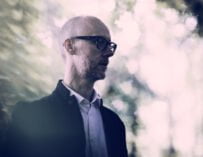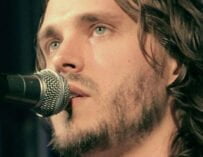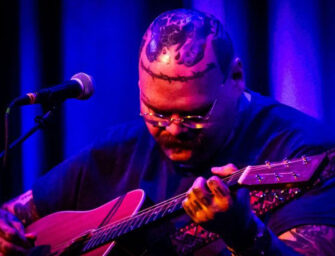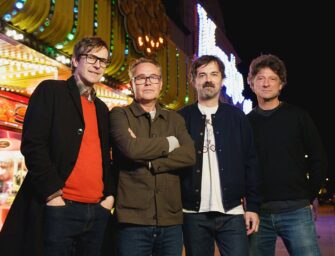
Ron Sexsmith: “I tend to write in batches. I’ll write an album-worth of songs, and I’ll even sequence it in a way too.” Photo: Kerry Vergeer
With 60 years and 17 albums behind him, the humble Canadian songwriter ruminates on songwriting longevity and recent pivotal moments
Nearly a decade since our last conversation, Ron Sexsmith remains one of Canada’s most beloved and respected songsmiths, cherished by fans and fellow musicians alike. Since our 2015 interview, which saw him reflect on his career milestones, he’s continued to carve out his own singular path with the quiet brilliance that first attracted admirers like Paul McCartney, Elvis Costello and Rod Stewart.
In this conversation, we quickly realise that Ron remains as inspired and creative as ever after 17 albums. He opens up about the journey behind his last record, The Vivian Line, recounting his pandemic-era recording experience in Nashville and his fascination with the city’s evolving music scene. Reflecting on his creative process, Ron shares his preference for working solo, how his songwriting remains purposeful, and the distinctive relationships he’s formed with various producers. We also discuss his celebrated ‘Sexsmith at Sixty’ concerts and the unique personal significance of performing at Canada’s iconic Massey Hall.
Join us as Ron reflects on his career’s enduring legacy and the motivation that keeps him writing and performing with passion and purpose…
Read more articles featuring Ron Sexsmith
Let’s talk about The Vivian Line, your last album. Why did you choose to go back to Nashville?
“Well, my manager is actually from Nashville, so I’ve been there many times. I mean, I had the songs, and this is the way it goes: when I have a batch of songs, I start thinking, ‘Oh, who might be a good fit to work with?’ Then I stumbled upon an interview with a guy named Brad Jones, who played bass on my second, third and fourth albums – he’s a phenomenal musician – and in the interview, he was saying some really nice things about my second album. So Brad came to mind and I just always liked hanging out with him, and I hadn’t talked to him in over a decade or so, so I just reached out to him. He has a studio down in Nashville that I’d been to way back in the 90s and it was still there in the same place.
“That was during the pandemic, so there were a lot of questions over whether or not I could even travel to America because the border was closed. But [when the lockdown was lifted] it was like this weird, magical portal that opened up where we were able to travel to Nashville. We spent three weeks down there, did the record, came back up, and as soon as we got back up, the border closed down again! It was just amazing to be down there because we’d been here [in Canada] under lockdown for so long, in Nashville it felt like the pandemic never happened.
“But it had changed so much. I hadn’t been in Nashville in a while and it was kind of crazy – we went down to the Ryman one night to see Jason Isabel play, and no drunk teenagers were stumbling around… I didn’t know what was going on, but anyway, I spent three weeks there and it was just me, Brad and a guy named Conrad Choucroun on drums, for the most part. Brad and I took turns playing keyboards and this and that, but it was just such a smooth experience. I knew he was a great musician, but I didn’t realize what a great producer and arranger he was..”
That was your seventeenth album, right? When you think about making each record, what spurs you on? Do you wait for a reason, for the stars to align and things to fall in place, or are you more workmanlike about it?
“It’s a bit of both because I tend to write in batches. I’ll write an album-worth of songs, and I’ll even sequence it in a way too. I mean, it’ll change, but oftentimes, before even going in the studio, I have Side A and Side B worked out. I’ve always done it like that. But it’s just this thing where I have an album of songs, and then I know it’s going to be an album – I just don’t know who’s going to help me do that.
“For example, when [Brad] heard the songs, he kept saying the term ‘baroque pop’ and that made the light bulb come on over my head. I did a record like that way back in ’90 called Whereabouts, which was strings and woodwinds and harpsichords and things, but I didn’t sing very well back then. I sing much better now, so I was excited at the opportunity of making that. Because I’m an anglophile, I love The Kinks and all that kind of stuff, and he heard the record going in that direction. So that’s really all I need, when I have a bunch of songs, is someone to help me with direction and tell me what the bass and drum should or could be doing. I have those ideas as well, but generally, there’s a lot that I defer to the producer.”
Does that relationship change when you work with different producers?
“I’ve been very lucky in my career [that] every producer I’ve worked with has been so different from each other. And I’m not a producer so, for me, that has helped give each album a certain kind of character of its own. With Mitchell Froom, every time we went in we would make a different album, just different instrumentation. And the same thing when I worked with Martin Terefe, we made three albums that are like night and day from each other and that’s exciting to me.”
We had the pleasure of interviewing Martin.
“We’re about to work together again, making a brand new album. I mean, it probably won’t come out till the next year or something, but I’m pretty excited.”
You don’t hang around!
“Yeah, I’ve been wanting to work with him for… I mean, the last time we worked together was 2007. He came to my show and I was so happy to see him. Next thing you know, we’re talking about [making] records.”

Ron Sexsmith: “I personally prefer to write by myself and, if I have to co-write, I prefer to do it long distance.” Photo: Kerry Vergeer
How do you normally go about deciding on a suitable producer?
“Well, in the beginning, I was happy working with Mitchell and Tchad [Blake], and I just wanted to work with those guys – I thought I’d found my George Martin, in a way. But those albums weren’t very successful, so the label was upset and so I started looking elsewhere after the third album. I worked with Steve Earle, and then Martin, and I did a few more with Mitchell later on.
“But, the thing is, I feel comfortable enough with what I’m doing that no producer, no matter who it is, is going to dominate the record. The albums are all about my songs and my point of view, or whatever, and then the production. It’s like a movie director – Tarantino, Spielberg – you could give them all the same script and they’ll make a very different movie. So it’s really about finding the right person who gets it. Even when I worked with Bob Rock, which was the slickest album I’d ever done, I knew the songs that I had were sturdy enough to withstand his kind of production, which was very big. Whereas, with some of my other albums, it would have been kind of silly.”
Tell me a little bit more about Nashville. What do you love most about the place?
“Well, you know, Nashville obviously means Music City. I remember going there for the first time when it was the Nashville Extravaganza – a convention down there, a bit like South by Southwest, and it was really exciting. I had a big showcase and it was not long after Elvis Costello had said nice things about my music, I was playing in this sort of church and I was about to start playing when the back doors opened up, and Elvis and his wife walked in! Everyone kind of stopped and he sat sort of near the front – my legs were shaking!
“I remember walking down Broadway, and I got the idea for a song called Average Joe, which was on my second album. I’d seen this tour bus coming towards me, right around where the Ryman Auditorium is, and I was thinking, ‘Oh, I wonder which big star is on that bus.’ And as it got closer, the sign in the window said, ‘Nobody you would know’. That gave me the first line of that song.”
Is there anything you don’t like about the city?
“Going back there to make The Vivian Line, I wasn’t super happy with the changes that have taken place there. I mean, it always felt like a small town with a real hometown feeling, and now it’s so built up, like a lot of cities are – I was a bit discouraged by that. When I worked with Steve Earle, I stayed at a hotel called the Spence Manor, which I think Elvis and the Beatles used to stay at – it had a guitar-shaped swimming pool, and it was a real piece of history. It was right near the RCA Studios and that’s not there anymore [it was converted into condominiums]. It always makes me sad when historic things aren’t valued. But I know the city is in there somewhere, I just didn’t recognize it the last time I went.”
Did you ever do any writing sessions there?
“My publisher sent me down to try my luck but I just didn’t like that scene at all – going in a room with somebody you don’t know and trying to write, like, nine-to-five. You know, they’re like doctor appointments, they go in and maybe they’re lucky and Carrie Underwood does their song, or something, I don’t know… I personally prefer to write by myself and, if I have to co-write, I prefer to do it long distance – someone sends me a lyric, I can write music and send it back, or vice versa. But, yeah, I think you have to be a special kind of person to do that every day.”
Let’s pick up the conversation from our last interview with you in 2015, just before you released The Last Rider.
“Yeah, that was actually the first time I’d ever made [an album] with my touring band. Because I did the Carousel One tour and the band was sounding so good to me, I just thought we got so tight, and I started thinking I really should make a record with these guys. I always felt that I would go down to somewhere like LA to make a record and use studio musicians, and then I got the idea that it would be really fun to do a record where we’re all living together in a place where we’re recording, sleeping and eating there, and everything. I’d always heard of The Tragically Hip’s studio called The Bathouse in Canada – it was kind of a rundown, old loyalist mansion with a swimming pool and everything. I think the band and I were there for five days, we had all these songs we had to get done in that time but because we were living at the studio, we could work from 12 till three in the morning. I guess I was inspired by The Rolling Stones’ Exile On Main St. which they did in a house in France – although, obviously, I don’t rock as hard as the Stones!
“So we did all the bed tracks, all the tracking, in the studio in five days, and then the rest of the record I worked with Don Kerr in his studio in Toronto, just doing the harmonies and all that. That album has really risen in my estimation, in terms of all my albums, it’s definitely in my top five personal favourites. Even though it didn’t do very well, I was very happy with how it sounded and how everyone played, so it was just a joyful experience.”

Ron Sexsmith: “I love songwriting, I love songwriters, and I always saw it as walking in the footsteps of these giants that changed my life.” Photo: Kerry Vergeer
How about Hermitage – you did that album with Don Kerr as well?
“Well, The Last Rider was recorded in 2016 and then a lot of things happened: I moved out of Toronto in 2017 and started writing the songs for Hermitage because I didn’t know anybody in Stratford, where I live now. At first, I spent so much time alone, just walking around the river and then coming back and playing the piano. When we moved, I told my wife, ‘I don’t want to meet anybody there. I just want to be a hermit,’ but it didn’t really work out the way – we made a lot of really good friends, but I already had the idea of calling it Hermitage, even before I had all the songs written.
“So I had these songs, I didn’t know what to do with them, and oftentimes I’ll bounce things off of Don because he’s one of my closest friends. So I sent him the demos, and – I thought he did such a good job on The Last Rider, but it was actually his idea – he said, ‘I think you should make a record like that, you know, like a Paul McCartney type album where you’re playing all the instruments.’ That had never occurred to me before, and the only thing I knew that I couldn’t play were the drums. So I said, ‘Okay, I can do that, but if you don’t mind playing the drums.’ Then it was also Don’s idea to record all the bed tracks at my house, so he came up with this whole studio in his car…
“We had this marathon session and managed to track all 14 songs, or whatever it was, and I’d been practising the piano so much that I’d finally got to a point where I could play confidently enough. That was the real stressful thing about it because I’m a crappy piano player, so just to be able to get through those takes… But then, just as the album was getting ready to be released, the pandemic struck and there was even a moment where I thought, maybe I shouldn’t release it. But because of its nature, it’s an upbeat album, I thought, ‘No, whoever’s interested in hearing it will appreciate it.’”
Also with the themes of solitude and being cooped up in your house, it was very apt for lockdown.
“Yeah, it was a happy accident. I mean, I never thought in my lifetime I would live through that, it was crazy. It was so weird, it had a dystopian… I’d be walking around the river, and you couldn’t go near anybody. Everyone was so freaked out. And then, I had all these tours that kept being postponed and postponed. Then finally, in 2022 we were able to tour the Hermitage album and that was surreal, too. My first show was in Dublin, Ireland, and just walking out on stage I got a hero’s welcome – all I did was sit on an airplane! But anyway, everyone was so thankful to get back to some normality.”
That’s a good way to segue into talking about your upcoming Sexsmith at Sixty shows. What prompted them?
“Well, it was only supposed to be the one show at Massey Hall, because it’s my favourite venue, and I didn’t really want it to be on my birthday. I thought I should do something and I could see the potential for some artistic sort of poster or something. At first, I thought maybe I should just do a 60-song playlist or something, but then I hadn’t played with my bands in so long – 2018 was the last time – and so I just thought, it has to be at Massey Hall… It’s my, it’s our Royal Albert Hall, it’s the place where I saw Lightfoot every year from 1986 until he died, I saw Leonard, Cohen and Dylan there… Sometimes, when I didn’t have any money, I would listen to the concerts by the stage door outside. It’s a very special place, so for me, it couldn’t be anywhere else. So we booked the show and it sold out. It was a very emotional evening for me. But because of that show, people out west in British Columbia were like, ‘Hey Ron, can you do a Sexsmith at Sixty show here? Then when we got the word out, my promoter in England thought we should bring it over there.”
It’s been 60 years and 17 albums, and you’re still going strong! What’s the secret, Ron?
“I just think, for me, when I found that I could write songs, it gave my life a sense of purpose. Because I didn’t do well in school and I had a young family, I had to make a living somehow. When I found I could write songs, I went all in. I thought, ‘I want to be the best songwriter I can be. I want to really apply myself to this thing,’ because I felt that’s how I’m able to contribute. Also, I think it’s the fact that I haven’t been super successful. Sometimes you see artists whose first albums are really good, but at a certain point they get lazy, or they start doing songs other people wrote.
“I’ve been very singular about what I do, and because I haven’t been like this insanely successful artist, with every album I feel like it’s my first album. So it’s another chance to win some people over or to introduce myself. Perhaps, with my next record, someone’s hearing me for the first time and then they find out I’ve got 17 other albums, you know? So, for me, it’s the thing where I feel I make myself useful. I love songwriting, I love songwriters, and I always saw it as walking in the footsteps of these giants that changed my life. I can’t believe I got in the door and I have this career, and I just feel I have to honour that. And all my heroes continue to write great music, even if the production was dated or whatever, they still kept writing… They persevered. They remain stoic. And so, sometimes I pinch myself when I go, ‘Oh my God, I made 17 albums!’ Because that’s all I ever wanted, was a body of work.”
































Related Articles